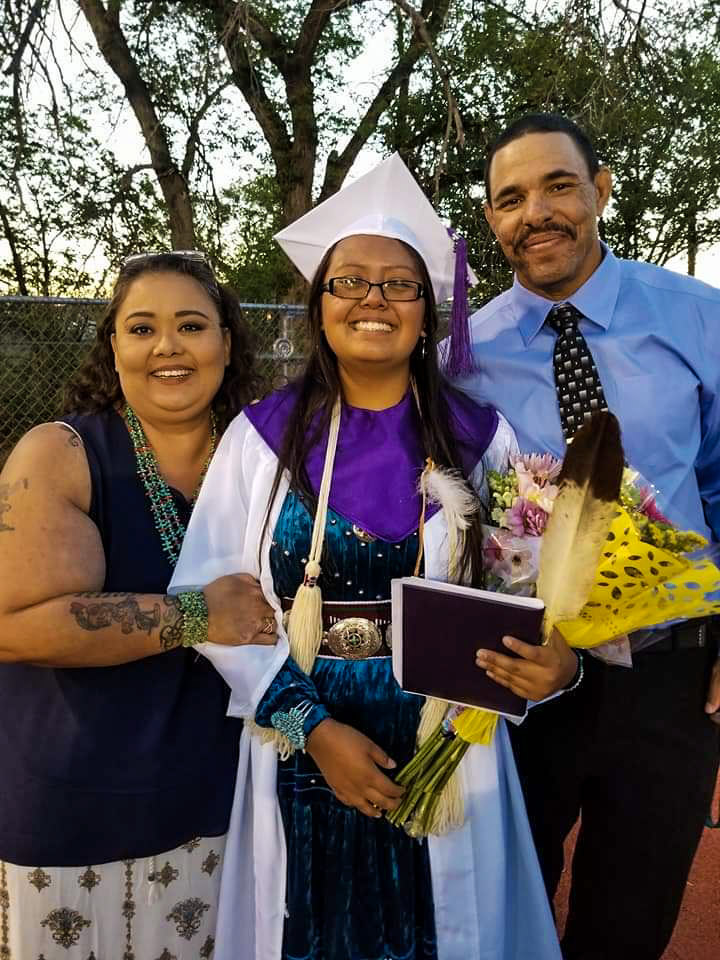Indianz.Com > News > Cronkite News: New law protects tribal regalia at school graduations
Arizona law allows Indigenous students greater cultural expression at graduation
Wednesday, November 24, 2021
Cronkite News
PHOENIX, Arizona — Just minutes before her high school graduation in Gallup, New Mexico, three years ago, Dakotah Harvey was told to remove the eagle feather from her mortarboard or she would be escorted out of the ceremony and her diploma would be withheld.
Her grandfather had tied the feather to the cap’s tassel earlier that day, Harvey told Cronkite News. He loaned it to her after performing a Navajo prayer in celebration of her achievement.
“I didn’t have the heart to tell him I couldn’t wear it,” Harvey said.
Arizona law allows Indigenous regalia
The Arizona bill, House Bill 2705, was introduced in early 2021 by Rep. Arlando Teller, D-Chinle, who later resigned from the Legislature to work for the U.S. Department of Transportation. The bill was championed by Rep. Jasmin Blackwater-Nygren, D-Red Mesa, a fellow Navajo, and passed in April.
At the Capitol on September 1, Lourdes Pereira, who is Hia-Ced O’odham and Miss Indigenous Arizona State University for 2020-21, stood at Ducey’s side as he signed legislation that included HB 2705.
In 2018, Pereira and fellow Pueblo High School graduate Maddy Jeans, who is Navajo, Pascua Yaqui and Otoe, successfully fought to change Tucson Unified School District policy to allow Indigenous students to wear cultural regalia at graduation. Previously, special permission was required.
Similar laws exist in California and Montana, and Utah lawmakers recently introduced similar legislation.
“Graduation is a milestone and is a ceremony,” said Jolyana Begay-Kroupa, Phoenix Indian Center director of development and Navajo language professor at Arizona State University.
The use of feathers and other cultural regalia is important to many tribes in celebrating significant points in life, she said, and it serves as a reminder to everyone that “we’re still here.”
Begay-Kroupa hopes the new law will prompt discussions that lead to better understanding between cultures.
Harvey, who’s now studying at ASU, wished more students and parents had advocated for a better, more inclusive graduation dress code.
“I think at the time we were just like, ‘You know what, we’re almost done with high school, we’re going to suck it up through the ceremony and just get through it and then we’re booking it out of here,’” she said.
It was my honor to meet with Governor @StephenRoeLewis and two student advocates before signing HB 2705. This is important legislation that ensures members of tribal nations and communities have the right to represent their culture. 1/ pic.twitter.com/DYESBrWRx1
— Doug Ducey (@DougDucey) September 1, 2021
Regalia allows for greater cultural expression
Such rules and policies can make it more difficult to celebrate milestones in culturally relevant ways within schools and make it harder to be Indigenous, especially for those living near towns bordering reservations.
Gallup is outside the southeastern border of the Navajo Nation Reservation in New Mexico and serves as a hub for commerce and education, which much of the reservation lacks.
Other Navajo Nation border towns are Flagstaff and Holbrook, as well as Farmington, New Mexico.
A life of commuting from the city to the reservation is common around these towns, which can have stark cultural differences.
“I know a lot of kids who struggled with trying to be a city kid, or a suburban kid, or a Native kid and they would struggle back and forth,” Harvey said.
Harvey hopes New Mexico adopts a similar law, which would support freer cultural expression and alleviate some of those struggles. She doesn’t want her younger siblings to endure what she did when they walk across the graduation stage.
For more stories from Cronkite News, visit cronkitenews.azpbs.org.
Note: This story originally appeared on Cronkite News. It is published via a Creative Commons license. Cronkite News is produced by the Walter Cronkite School of Journalism and Mass Communication at Arizona State University.
Search
Filed Under
Tags
More Headlines
Native America Calling: No ordinary animal
Native America Calling: Safeguards on Artificial Intelligence
NAFOA: 5 Things You Need to Know this Week
Chuck Hoskin: Cherokee Nation takes the lead for our environment
Native America Calling: Earth Day assessment for Native peoples
Cronkite News: Gathering addresses ‘epidemic’ among Native people
VIDEO: Cody Desautel on tribes and federal forest management
AUDIO: Legislative Hearing on Discussion Draft of Forest Management Bill
Native America Calling: Remembering the 1974 Navajo border town murders
Native America Calling: Can the right approach close the Native immunization gap?
Cronkite News: Long COVID cases remain high in Arizona
Native America Calling: Eyes in the sky for development, public safety, and recreation
Native America Calling: Three new films offer diverse views of Native life
NAFOA: 5 Things You Need to Know this Week
Chuck Hoskin: Cherokee Nation works toward cure for arthritis
More Headlines
Native America Calling: Safeguards on Artificial Intelligence
NAFOA: 5 Things You Need to Know this Week
Chuck Hoskin: Cherokee Nation takes the lead for our environment
Native America Calling: Earth Day assessment for Native peoples
Cronkite News: Gathering addresses ‘epidemic’ among Native people
VIDEO: Cody Desautel on tribes and federal forest management
AUDIO: Legislative Hearing on Discussion Draft of Forest Management Bill
Native America Calling: Remembering the 1974 Navajo border town murders
Native America Calling: Can the right approach close the Native immunization gap?
Cronkite News: Long COVID cases remain high in Arizona
Native America Calling: Eyes in the sky for development, public safety, and recreation
Native America Calling: Three new films offer diverse views of Native life
NAFOA: 5 Things You Need to Know this Week
Chuck Hoskin: Cherokee Nation works toward cure for arthritis
More Headlines
